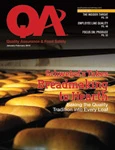It’s like a Better Business Bureau with enforcement capabilities—providing produce buyers and sellers with protection from unfair and fraudulent practices; offering dispute resolution and mediation for produce transactions; and enabling sellers to recover debts from bankrupt and out-of-business firms.
The Perishable Agricultural Commod-ities Act (PACA) was enacted in 1930 at the request of the fruit and vegetable industry, where even a single day’s delay in a transaction can impact the salability and profitability of these highly perishable products. Administered by USDA, PACA promotes fair trade for businesses dealing in fresh and frozen fruits and vegetables by establishing and enforcing a code of fair business practices and helping companies resolve business disputes.
In the 1930s, there were various state attempts to assist the produce industry, but there was no standard or national enforcement ability, said Karla Whalen, the PACA Branch Chief. As cross-country trading accelerated, problems began to arise, particularly as buyers or sellers ended up in unscrupulous transactions with those from the opposite coast, and the Great Depres-sion caused further questionable practices.
Because produce can deteriorate quickly, it has to be sold fast without a lot of credit checks, Whalen explained. Thus, the enacting of a national statute provided protection through a new code of fair trading practices for produce growers, shippers, distributors and retailers in interstate and foreign commerce.
PACA is enforced through a licensing sys-tem in which almost all produce traders must maintain a valid PACA license, under which the company agrees to be held to certain responsibilities and comply with terms of all contracts into which they enter, including:
- Sellers must ship the quantity and qual-ty of produce specified.
- Buyers must accept shipments that meet contract specifications and pay promptly after acceptance.
- Prompt payment means payment within 10 days unless the buyer and seller agree in writing, prior to the sale, to extend payment time.
Common PACA violations that prompt USDA disciplinary action include:
- failure to pay for purchased produce;
- slow payment;
- flagrant misbranding or misrepresentation of produce;
- making false and misleading statements for a fraudulent purpose;
- employing a restricted person.
In addition, Whalen said, "PACA law is slightly distinct from other laws, because produce dealers that meet certain thresholds are required to be PACA licensed."
Firms that operate without a valid license are subject to fines and court injunction. If a firm’s license is revoked or suspended, neither the firm nor any persons responsibly connected with the firm can engage in business under PACA or be employed by a PACA-licensed firm, until specified requirements are met.
The addition of the PACA trust in 1984 "added a whole extra layer of protection that, to my knowledge, no one else has," Whalen said. One important aspect of the trust is that it puts the produce sellers with which a bankrupt buyer has debts first in line for compensation. "That’s really a jewel in this law that so many other commodities don’t have."
While PACA imposes regulations more stringent and binding than most in the food industry, they are generally supported by the produce segment because they were involved in the development and sponsoring of the laws. Since its enacting, the law has been amended several times to keep pace with changing trade practices.
Whalen anticipates the issuance of two proposed rules for comment in 2010, in-cluding a license fee increase, which was last raised in 1995, and clarification of the trust regulation. Jurisdiction of enforcement is held by the district courts, but some of the resulting rulings have appeared to be con-trary to the intent of the law, so clarification of the regulations is expected, Whalen said, explaining, "It doesn’t change the statute at all, it just clarifies it."

Explore the February 2010 Issue
Check out more from this issue and find your next story to read.
Latest from Quality Assurance & Food Safety
- Chef Robotics Introduces Pat-Down Capability for Meal Presentation and Sealing
- USDA Launches Regenerative Pilot Program
- Indoor Ag-Con Adds Food Safety Track to Conference Lineup
- IDFA Recognizes Federal Officials for Support of U.S. Dairy Industry
- Tetra Pak Acquires Bioreactors.net
- Fresh Del Monte Receives Rabobank Leadership Award
- São Paulo Earns Guinness World Record for Largest Municipal Food Security Program
- KPM Analytics Releases Ready-to-Use NIR Calibration Packages





